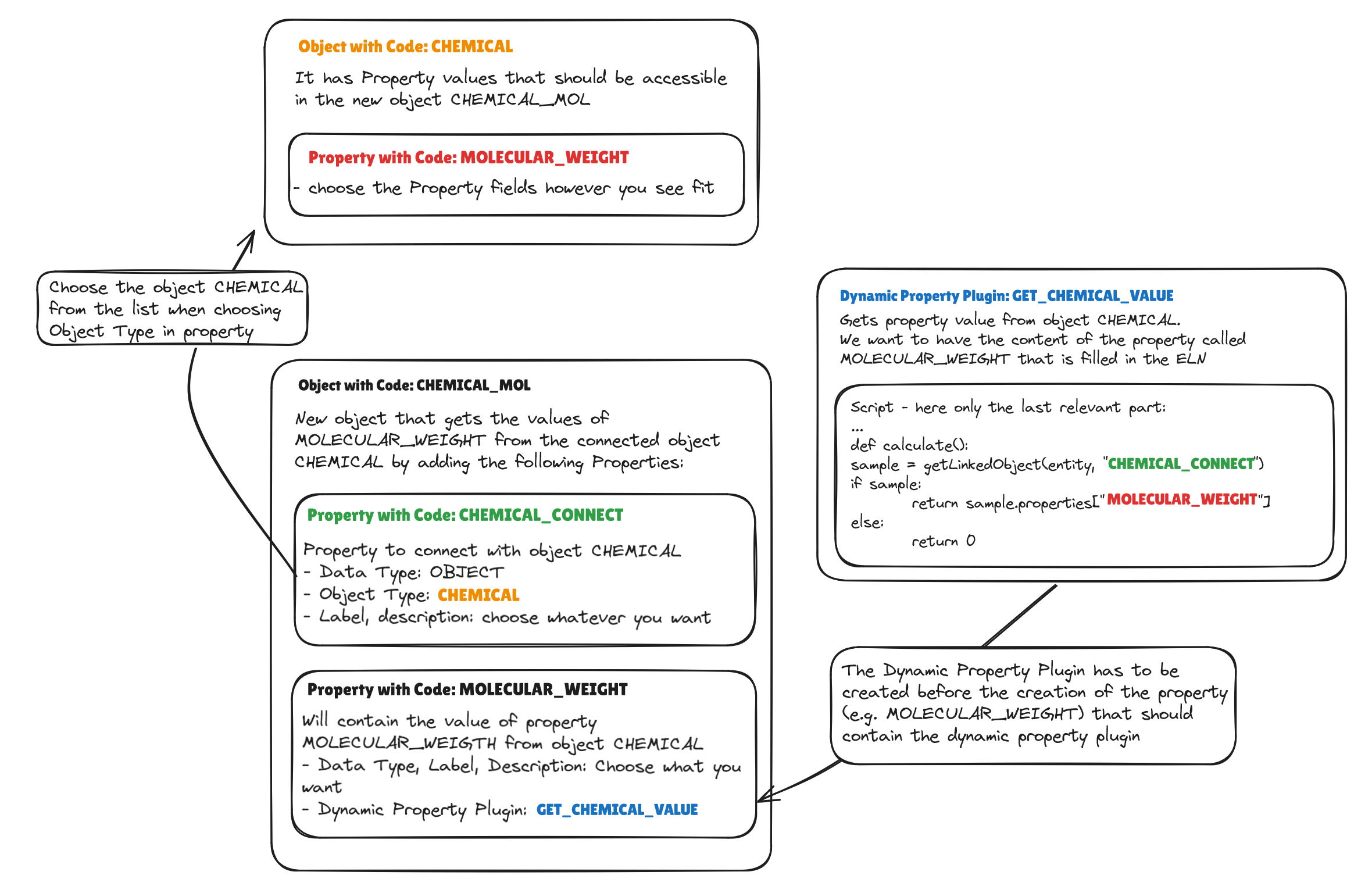Dynamic property: Get value of a property in an object
Background
You have created an OBJECT in openBIS (e.g called CHEMICAL) and you would like to create a new OBJECT (e.g. called CHEMICAL_MOL) which contains automatically values of a Property (e.g. called MOLECULAR_WEIGHT) from the OBJECT CHEMICAL.
To do this, you can use the property type OBJECT during the creation of an Object type. This property type OBJECT can be assigned to one or more properties. Using this property type, users can create a fixed 1:1 link between two objects, similar to parent-children relationships but limited to a single entity.
View the picture below for instructions and get the whole script of the dynamic property plugin in the section below:

Using OBJECT properties in dynamic properties plugin sripts
Unfortunately, when using the dynamic properties plugin, the standard method getPropertyValue (see here) called on a property of type OBJECT returns null instead of the property value as it should.
If you still want to access it value, you need to use a workaround. The idea behind this is explained below.
Because the dynamic property scripts are written in jython we can import the openBIS V3 Java API and use other methods to retrieve the linked object. Once we have this, we can access its contents using the methods of the V3 API.
Below is the script which is used in the example of the picture above:
1
2
3
4
5
6
7
8
9
10
11
12
13
14
15
16
17
18
19
20
21
22
23
24
25
26
27
28
29
30
31
32
33
34
35
36
37
38
39
40
41
42
43
44 | from ch.ethz.sis.openbis.generic.asapi.v3.dto.sample.update import SampleUpdate;
from ch.ethz.sis.openbis.generic.asapi.v3.dto.sample.id import SamplePermId;
from ch.systemsx.cisd.openbis.generic.server import CommonServiceProvider;
from ch.ethz.sis.openbis.generic import OpenBIS;
from ch.ethz.sis.openbis.generic.asapi.v3.dto.sample.fetchoptions import SampleFetchOptions;
from ch.ethz.sis.openbis.generic.asapi.v3.dto.sample.id import SamplePermId
def getLinkedObject(entity, name):
"""
This function takes an entity (available in `calculate`) and a property
name (`name`) that corresponds to an an object property with the OBJECT type and returns a V3 API Sample object corresponding to the object
the property refers to or None if the sample or the property cannot be found
"""
#Get the V3 api and connect as system user
session_token = CommonServiceProvider.getApplicationServerApi().loginAsSystem();
v3api = OpenBIS("http://localhost:8080");
v3api.setSessionToken(session_token);
#Configure the fetch options used to retreive the sample from the V3 API
sfo = SampleFetchOptions()
#This means that we retreive properties but also children and the parents of the object the property links to
sfo.withProperties()
sfo.withChildren()
sfo.withParents()
# Get the string value of the TESTOBJECT property using the "normal" dynamic property API
pe = entity.property(name)
if pe:
permid = pe.getPropertyPE().tryGetUntypedValue()
#Create a SamplePermID object, this is needed by the getSamples method of the V3 API
ipermid = SamplePermId(permid)
result = v3api.getSamples([ipermid], sfo)
return result.get(ipermid)
def calculate():
#Be careful here: if the property with the chosen name does not exist, sample is None
sample = getLinkedObject(entity, "CHEMICAL_CONNECT")
if sample:
#Get the properties of the sample.
# Be careful, the "sample" object is a V3 API object (https://openbis.ch/javadoc/20.10.x/javadoc-api-v3/ch/ethz/sis/openbis/generic/asapi/v3/dto/sample/Sample.html)
# while the entity object (which is available in calculate) implements IEntityPropertyAdapter (https://openbis.ch/javadoc/20.10.x/javadoc-dynamic-api/ch/systemsx/cisd/openbis/generic/shared/hotdeploy_plugins/api/IEntityPropertyAdaptor.html)
# The properties are a Java Map, they can be accessed like a dictionary using []
return sample.properties["MOLECULAR_WEIGHT"]
# Don't forget to always add error handling, in this case it is:
else:
return 0
|
Last update:
December 18, 2024
